T.G.I.M. audiences focus on meaning and message of indie films
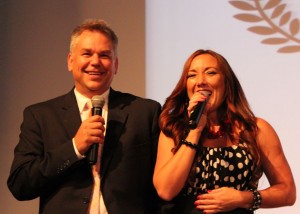 According to the widely quoted African proverb, it takes a village to raise a child. That’s also true when it comes to interpreting many of the films submitted to Eric Raddatz and Melissa Tschari DeHaven for inclusion in the Fort Myers Film Festival.
According to the widely quoted African proverb, it takes a village to raise a child. That’s also true when it comes to interpreting many of the films submitted to Eric Raddatz and Melissa Tschari DeHaven for inclusion in the Fort Myers Film Festival.
Rather than sitting in a darkened room in an undisclosed location somewhere, Raddatz and  DeHaven screen a cross-section of the films they receive at the Sidney & Berne Davis Art Center on the first Monday of each month between August and the ensuing February for a couple of hundred enthusiastic cineastes who Raddatz unabashedly describes as “the most intelligent people in Fort Myers.” Each Thank God for Indie Monday (or T.G.I.M.) attendee is given a ballot on which they can rate each film from one (“it sucks, I couldn’t hate it more and, by the way, Eric, I hate you, I hate you, I
DeHaven screen a cross-section of the films they receive at the Sidney & Berne Davis Art Center on the first Monday of each month between August and the ensuing February for a couple of hundred enthusiastic cineastes who Raddatz unabashedly describes as “the most intelligent people in Fort Myers.” Each Thank God for Indie Monday (or T.G.I.M.) attendee is given a ballot on which they can rate each film from one (“it sucks, I couldn’t hate it more and, by the way, Eric, I hate you, I hate you, I 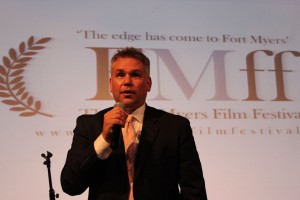 hate you so much) to five (“it touched me profoundly and made me think of things I never, ever considered before”). But it’s during the open discussion that follows each screening that true insight, deep revelations and astonishingly perceptive observations come out.
hate you so much) to five (“it touched me profoundly and made me think of things I never, ever considered before”). But it’s during the open discussion that follows each screening that true insight, deep revelations and astonishingly perceptive observations come out.
Of course, Raddatz and DeHaven recognize that it can sometimes prove difficult to  elicit comments from the audience after showing a cryptic, enigmatic or, frankly, confusing film. Few are willing to embarrass themselves and no one wants to go first. To work around this all too human and natural frailty, Eric and Melissa conscript a panel of celebrity judges to get the discussion going. But because of their background and expertise in theater, film and entertainment, the judges
elicit comments from the audience after showing a cryptic, enigmatic or, frankly, confusing film. Few are willing to embarrass themselves and no one wants to go first. To work around this all too human and natural frailty, Eric and Melissa conscript a panel of celebrity judges to get the discussion going. But because of their background and expertise in theater, film and entertainment, the judges  typically focus on the film’s technical merits (or lack thereof), including sound, lighting and editing, along with the strength or weakness of the performances turned in by the film’s cast of actors. While of some interest to attendees, T.G.I.M. audience members are typically far more interested in the film’s meaning and message.
typically focus on the film’s technical merits (or lack thereof), including sound, lighting and editing, along with the strength or weakness of the performances turned in by the film’s cast of actors. While of some interest to attendees, T.G.I.M. audience members are typically far more interested in the film’s meaning and message.
The short and short short films screened this past Monday night 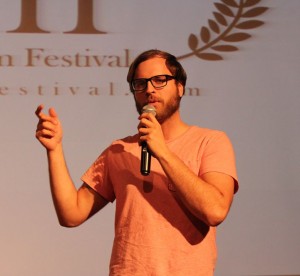 are a case in point.
are a case in point.
For example, filmmaker Tyler Short had the unenviable task of commenting first on a short film by the name of Papers, which personified two official documents that end up jumping into a paper shredder as people seek to break down the locked door to the vacant office in which they are sequestered.
“I’m still searching for the meaning of the film, though I’m sure it was there,” Shore confessed. “I had  trouble following the dramatic arc,” added actor and Florida Rep Artistic Director Jason Parrish, who added that the film was so short that he felt deprived of a beginning, middle and end. Actress/model Mercedes Gutierrez agreed, saying “I didn’t really get the point.”
trouble following the dramatic arc,” added actor and Florida Rep Artistic Director Jason Parrish, who added that the film was so short that he felt deprived of a beginning, middle and end. Actress/model Mercedes Gutierrez agreed, saying “I didn’t really get the point.”
But in the ensuing audience discussion, theories were advanced that the reason the papers had to be destroyed was because they contained information that, had it come out, would have done more harm than good. Noticing that the office contained an old 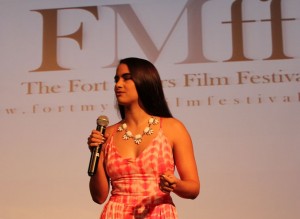 Apple computer monitor, one audience member conjectured that the papers contained the names of John F. Kennedy’s true assassins. Ignoring the time reference contained in the film and with leaks of NSA information on Russian hacking in the news virtually every day, someone else postulated that the film was a metaphor for leaking classified documents to media outlets. “Think coup
Apple computer monitor, one audience member conjectured that the papers contained the names of John F. Kennedy’s true assassins. Ignoring the time reference contained in the film and with leaks of NSA information on Russian hacking in the news virtually every day, someone else postulated that the film was a metaphor for leaking classified documents to media outlets. “Think coup 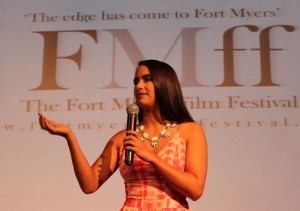 [d’etat],” summed up musician and former Planters keyboard player and vocalist Al Holland, adding depth and texture to a short film that might otherwise have been dismissed as regrettably simplistic.
[d’etat],” summed up musician and former Planters keyboard player and vocalist Al Holland, adding depth and texture to a short film that might otherwise have been dismissed as regrettably simplistic.
It was Holland again who provided an exclamation point on the audience’s interpretation of the next film, titled Croissants. This 6:25 minute short filmed in Barcelona depicts a couple (played 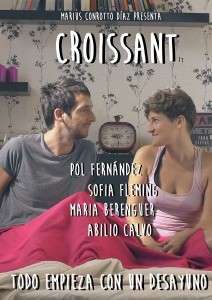 by Pol Fernandez and Sofia Fleming) waking in the morning following an impromptu hook-up (“What is your name, again?”). She sends him out to the corner bakery for two fresh and tender natural croissants, but when he returns, she ignores the buzzer to her apartment. When he finds a way inside , his knock at her door is answered by a man who she wordlessly identifies as her husband by holding up the wedding ring that she’s returned to her left hand.
by Pol Fernandez and Sofia Fleming) waking in the morning following an impromptu hook-up (“What is your name, again?”). She sends him out to the corner bakery for two fresh and tender natural croissants, but when he returns, she ignores the buzzer to her apartment. When he finds a way inside , his knock at her door is answered by a man who she wordlessly identifies as her husband by holding up the wedding ring that she’s returned to her left hand.
Celeb judges Jason Parrish and Mercedes Gutierrez both focused on the film’s hopeful ending, in which the dejected guy returns to the bakery and makes a connection with the young girl behind the counter who sold 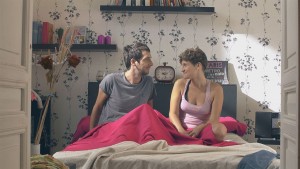 him the two croissants. Members of the audience labeled the ending as “redemption” for him not outing the girl to her husband, a decision that demonstrated that he’d “held his own and retained his dignity.” One audience member even praised the young woman for being so resourceful in letting her one-nighter know that the man standing next to her was her
him the two croissants. Members of the audience labeled the ending as “redemption” for him not outing the girl to her husband, a decision that demonstrated that he’d “held his own and retained his dignity.” One audience member even praised the young woman for being so resourceful in letting her one-nighter know that the man standing next to her was her 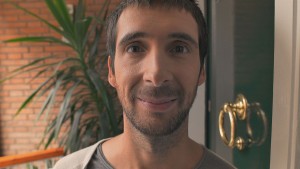 husband without saying a word. But then Al Holland picked up on something that no one else had noticed.
husband without saying a word. But then Al Holland picked up on something that no one else had noticed.
“She only asked him to go get the croissants after she got a call on her cell phone,” he remarked. “Prior to that, they’d been talking about going out for breakfast together,” 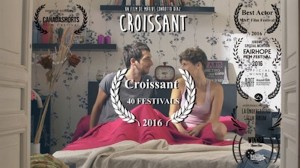 leaving the implication that they’d return to her apartment afterwards. But what the woman hadn’t counted on was her new lover’s persistence or that he’d find a way to get inside the apartment building and show up at her door.
leaving the implication that they’d return to her apartment afterwards. But what the woman hadn’t counted on was her new lover’s persistence or that he’d find a way to get inside the apartment building and show up at her door.
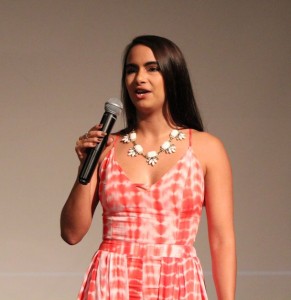 The film, which is produced and directed by Marius Conrotto, has been accepted into 40 film festivals to date, with one conferring its Best Actor award on Pol Fernandez.
The film, which is produced and directed by Marius Conrotto, has been accepted into 40 film festivals to date, with one conferring its Best Actor award on Pol Fernandez.
One film that was roundly praised by both the celebrity judges and the T.G.I.M. audience was LOC, an animated film in which people with clock heads discussed their perceptions of time. Mercedes Gutierrez singled out a clock-headed homeless man whose sign read, Can you spare a minute? “I wonder,” mused the actress/model, “how many of us would actually spare a  minute for someone they didn’t know?”
minute for someone they didn’t know?”
An inveterate filmmaker, Tyler Shore surmised that the filmmaker interviewed people from all walks about what time meant to them and then personified their answers in the auspices of people who had intricately-crafted clocks for faces and heads. “It’s so stupid but complex at the same time,” he effused. “It’s perfect.”
Harkening to his background, training and experience as an a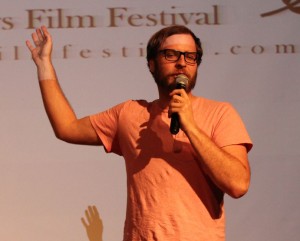 ccomplished director, Jason Parrish was impressed by the various characters and characterizations presented by the film. “Sundial, genius,” he proclaimed of a woman who continuously oriented her gnomon towards the sun so that it could cast a shadow on her dial. “Hour glass, genius,” he added, referring to a man doing a headstand on the beach whose sand formed an integral part of his head.
ccomplished director, Jason Parrish was impressed by the various characters and characterizations presented by the film. “Sundial, genius,” he proclaimed of a woman who continuously oriented her gnomon towards the sun so that it could cast a shadow on her dial. “Hour glass, genius,” he added, referring to a man doing a headstand on the beach whose sand formed an integral part of his head.
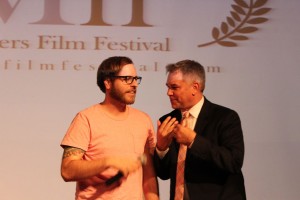 But once again, it was left to the audience to comment on the theme or philosophical meaning of the film itself. “The ridiculousness of the clock heads,” offered one audience member, “ is a metaphor for the ridiculousness of trying to conceptualize time.”
But once again, it was left to the audience to comment on the theme or philosophical meaning of the film itself. “The ridiculousness of the clock heads,” offered one audience member, “ is a metaphor for the ridiculousness of trying to conceptualize time.”
Actually, Jason Parrish had it right when he used the term “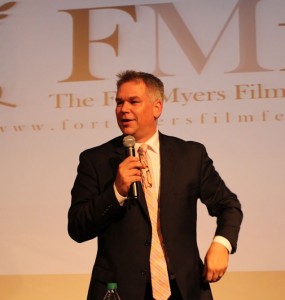 genius.” That was also the term applied to German philosopher Martin Heidigger when he published Being and Time in 1927. Heidegger argued in the book that since the epoch of the ancient Greeks, philosophers had focused on individual or specific beings (i.e. the particular clockheads portrayed in the film) rather than analyzing the central concept of “being.” And thus, perhaps the significance of LOC inheres not in how each individual clockhead perceives time, but rather in what life would be like for all clockheads if they could live life
genius.” That was also the term applied to German philosopher Martin Heidigger when he published Being and Time in 1927. Heidegger argued in the book that since the epoch of the ancient Greeks, philosophers had focused on individual or specific beings (i.e. the particular clockheads portrayed in the film) rather than analyzing the central concept of “being.” And thus, perhaps the significance of LOC inheres not in how each individual clockhead perceives time, but rather in what life would be like for all clockheads if they could live life 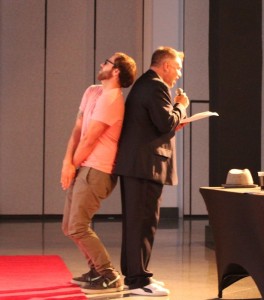 without reference to time … assuming, arguendo, that temporal beings can chose to live totally existentially with an eye on either the past or the future.
without reference to time … assuming, arguendo, that temporal beings can chose to live totally existentially with an eye on either the past or the future.
While the smartest people in Fort Myers may or may not congregate in the Davis Art Center’s grand atrium for T.G.I.M., you’ll be hardpressed to find anyone dealing with such heady constructs anywhere else in Fort Myers, if not all of Southwest Florida.
But wait a minute. Let’s take a minute. It’s not all seriousness and intellectualization.
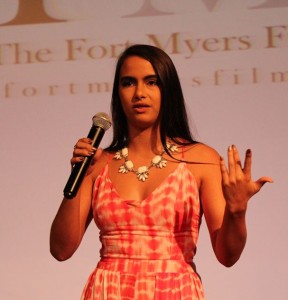 Parrish used another operative term in describing LOC – irreverent.
Parrish used another operative term in describing LOC – irreverent.
And as if to counter-balance some of the heavy themes and discussion, Parrish, Gutierrez, Shore and Raddatz took terms poking fun at the films and cutting up in general, fomenting the type of humor characteristically found at a comedy club during a stand-up routine. That’s the charm of T.G.I.M. Nobody takes themselves too seriously.
If you missed T.G.I.M. this past Monday, shame on you.
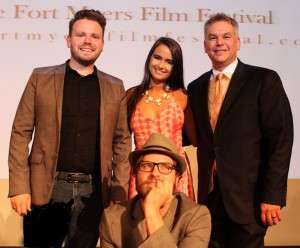 But don’t be shamed a second time. The next T.G.I.M. takes place on Monday, September 4 – the perfect way to end your Labor Day weekend.
But don’t be shamed a second time. The next T.G.I.M. takes place on Monday, September 4 – the perfect way to end your Labor Day weekend.
August 9, 2017.
RELATED POSTS.
- T.G.I.M. returns to Davis Art Center on August 7
- Filmmaker Tyler Shore sharing judging duties at August 7 T.G.I.M.
 Actress and model Mercedes Gutierrez one of August’s T.G.I.M. celebrity judges
Actress and model Mercedes Gutierrez one of August’s T.G.I.M. celebrity judges- Jason Parrish one of T.G.I.M. celeb judges for August
- Frankie Colt returns to Davis Art Center for T.G.I.M.
- About the 8th Annual Fort Myers Film Festival














 Tom Hall is both an amateur artist and aspiring novelist who writes art quest thrillers. He is in the final stages of completing his debut novel titled "Art Detective," a story that fictionalizes the discovery of the fabled billion-dollar Impressionist collection of Parisian art dealer Josse Bernheim-Jeune, thought by many to have perished during World War II when the collection's hiding place, Castle de Rastignac in southern France, was destroyed by the Wehrmacht in reprisal for attacks made by members of the Resistance operating in the area. A former tax attorney, Tom holds a bachelor's degree as well as both a juris doctorate and masters of laws in taxation from the University of Florida. Tom lives in Estero, Florida with his fiancee, Connie, and their four cats.
Tom Hall is both an amateur artist and aspiring novelist who writes art quest thrillers. He is in the final stages of completing his debut novel titled "Art Detective," a story that fictionalizes the discovery of the fabled billion-dollar Impressionist collection of Parisian art dealer Josse Bernheim-Jeune, thought by many to have perished during World War II when the collection's hiding place, Castle de Rastignac in southern France, was destroyed by the Wehrmacht in reprisal for attacks made by members of the Resistance operating in the area. A former tax attorney, Tom holds a bachelor's degree as well as both a juris doctorate and masters of laws in taxation from the University of Florida. Tom lives in Estero, Florida with his fiancee, Connie, and their four cats.